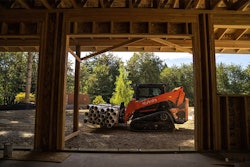The Associated Builders and Contractors, Inc. (ABC) members “can expect a mixed bag in terms of construction activity in 2010,” according ABC’s Nov. 9 construction economic outlook.
The report notes that federally funded projects, such as water/sewer and road resurfacing projects, are likely to see a stable 2010. However, areas “less aligned with federal spending” will have a tougher year.
“We can now safely say that the recession is over,” ABC says in its 2010 forecast. “Thought to have begun in December 2007 and likely concluded during the late summer of 2009, this recession was in many ways the deepest since World War II and has impacted every state and every metropolitan area, some more than others.”
ABC Chief Economist Anirban Basu says in a report from ABC: “While the industry battled the effects of the recession in 2009, expect 2010 to be a transitional but sluggish year on the road to recovery.”
On the jobs front, in 2010 the nonresidential construction industry is expected to see job loss decelerate and slowly turn around, ABC reports.
The organization says it expects employment to be down only in the mid- to high single digits on a year-over-year percent change basis compared to a recent 12-month period that saw nonresidential construction employment down 13.2 percent, and heavy and civil engineering down 12.6 percent.
“In addition, the stimulus-related activity that began manifesting itself in ABC’s Construction Backlog Indicator in May 2009 will continue to steadily translate into actual construction spending into the next year and further,” according to the report.
“The financial crisis that began in 2007 and deteriorated significantly in September 2008 also led to the introduction of a variety of policies designed to jump-start the economy, including the American Recovery and Reinvestment Act of 2009 (ARRA),” said Basu.
“One of the bigger beneficiaries of ARRA will be the public sector,” Basu noted. “Public buildings – particularly courthouses and federal facilities in need of modernization – will receive a sizable increase next year due to stimulus funds reaching the market.”
ABC expects institutional construction, including hospital construction, to be soft due to depleted state and local budgets and significant pressure to contain health care costs. However, state governments will continue to receive substantial support from the federal government over the next year, which will help stabilize capital budgets.
The outlook for materials prices looks to be roughly flat next year after falling nearly 8 percent between August 2008 and August 2009, although a sharp downturn in the dollar could generate increases even in the presence of a still weak U.S. construction economy, according to ABC’s outlook.
“Construction firms should prepare for 4 percent to 6 percent growth in construction costs per annum during the next several years, which is considerably slower than the two-year average for 2008 and 2009,” Basu said.
ABC predicted commercial, lodging and office construction will see a rough 2010 as office vacancy rates rise and hotel occupancy rates continue to fall. In addition, construction related to manufacturing is expected to be off 19 percent as the sector is unable to keep up with the brisk pace of activity it has seen in previous years.
For the results of Better Roads’ proprietary annual industry forecast from the magazine’s Editor-in-Chief John Latta, check out the January 2010 print edition of Better Roads magazine. The forecast also will be available at www.BetterRoads.com.










